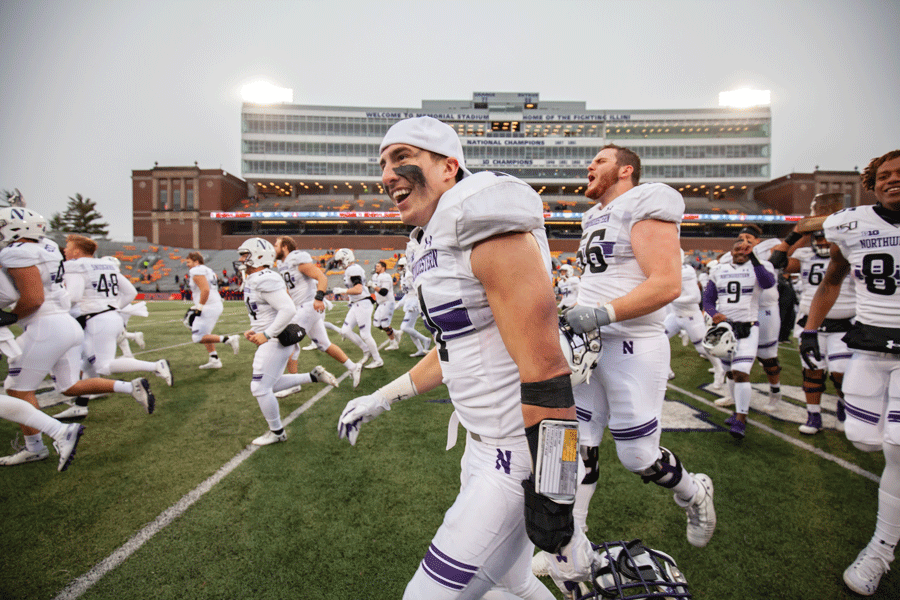College sports show interactions with people from other backgrounds affects policy attitudes, professor suggests
Joshua Hoffman/The Daily Northwestern
Football players jog across the football field. Prof. James Druckman spoke Monday afternoon in Chambers Hall about a recent paper he co-authored which utilizes college athletics as a case study for how identity and social interaction affect opinions on policy change.
January 6, 2020
Prof. James Druckman spoke Monday afternoon in Chambers Hall about a recent paper he co-authored which utilizes college athletics as a case study for how identity and social interaction affect opinions on policy change.
The study suggests that interpersonal contact between people of different identities can change attitudes on and create coalitions for policy innovation, but that institutions can prevent or blunt those interactions. Druckman, Northwestern’s Payson S. Wild Professor of Political Science and an Institute for Policy Research fellow at Northwestern, co-authored the study with Elizabeth Sharrow, an assistant professor of political science and history at the University of Massachusetts Amherst.
The study — which collected about 32,000 email contacts — surveyed NCAA athletes, coaches and school administrators. Respondents’ own identities and level of interaction with black and female athletes were compared with their approval of policies supporting those two groups.
“The idea here is that the more somebody who’s not a member of that group interacts with members of that group, the more they’re going to learn their perspective and possibly come to support those policies views,” Druckman said.
Male athletes who interact with female athletes for a comparatively larger share of time were found to be more supportive of proposed NCAA gender equity policies, Druckman said. Similarly, non-black athletes who spent more time with black athletes were more supportive of policies designed to support black athletes.
“But — and here’s the institutional ‘but’ — contact depends on institutions that facilitate it,” Druckman said.
As of now, Druckman said that isn’t happening.
The largely gender-separated nature of athletic competitions constitute a clear barrier. According to Druckman, only nine percent of sports are coed. Meanwhile, 81 percent of black athletes participate in either football, basketball or track and field, limiting the potential for interracial interactions in other sports.
Druckman attributed this disparity to more “informal institutions” and historical barriers.
Political science Prof. John Bullock attended the talk and took particular note of these divides.
“I had not sufficiently appreciated the extent to which college sports are segregated along gender and racial lines,” Bullock said.
Druckman suggested that institutions subvert potential shifts toward policy change on an administrative level as well. While black and female athletes were more likely to support and prioritize policies aiming to support their demographic, that was less substantial for black and female athletic administrators working at colleges. This could be a result of tension between administrators’ social identities and work identities, Druckman said.
SESP professor Tabitha Bonilla found the application of sociology to college sports particularly interesting.
“I don’t think I’ve seen politics carried out outside of a political realm, and so I think to see the terms we talk about translating to other domains is really nice to see,” Bonilla said.
Druckman discussed the originality of the application as well. He said when he reads the sports section, he feels like he’s reading about politics or law.
“It’s a really fruitful domain that I think political scientists have completely missed out on and could contribute in quite substantial ways,” Druckman said.
Email: [email protected]
Twitter:@jacksonfire123


